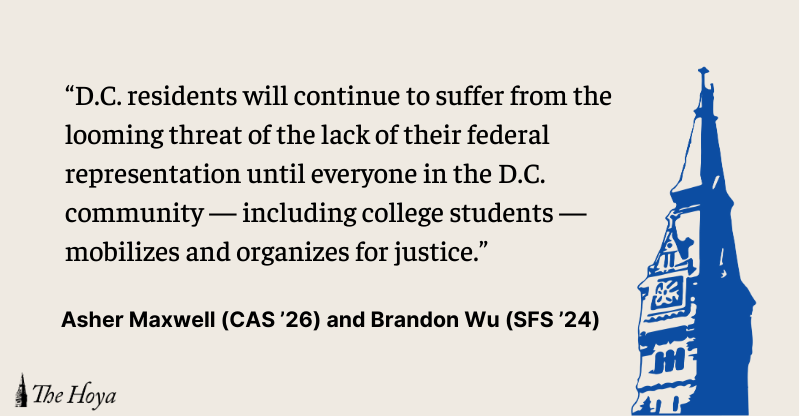While many consider Washington, D.C., a liberal stronghold, a starkly different reality could soon emerge. A Republican Congress and presidency after the 2024 elections could abolish D.C.’s autonomy and its progressive policies because District residents continue to lack congressional voting power to potentially stop Congress from using its right to overturn local D.C. laws.
D.C. residents will continue to suffer from the looming threat of the lack of their federal representation until everyone in the D.C. community — including college students — mobilizes and organizes for justice.
The risk to D.C. autonomy is clearly seen through reproductive rights battles. In the Dobbs v. Jackson Women’s Health Organization ruling that overturned Roe v. Wade, the Supreme Court permitted states to decide their own policies on abortion rights and reproductive health care. But D.C. is not a state — so Congress, at any moment, could ban abortion and other forms of birth control, despite 70% of polled D.C. residents favoring abortion in most cases.
There have been, in the past, consequences for mobilizing too late — although thousands showed up to march in D.C. to protect abortion rights, 13 states have still completely banned abortion. While D.C. losing its autonomy may incite a flurry of Instagram stories and rallies, the damage that Republicans could do would take years to reverse, and by then, activism will be merely performative.
Despite claims of being “small-government conservatives,” many Republicans are set on abolishing the District’s autonomy. To secure far-right Republicans’ votes, current Speaker of the House Kevin McCarthy (R-Calif.) agreed to allow members to attach riders — controversial measures mostly attached to large bills that would not pass on their own — to crucial budget bills.
These riders could end D.C.’s control over its local affairs. They have been used in the past to block D.C. from legalizing the sale of marijuana and assisting low-income women with accessing abortions.
Republicans could easily force Democrats to either vote to shut down the government to prevent the abolition of the Council of the District of Columbia or vote to fund the government while undermining the District’s autonomy.
President Joe Biden recently signed a GOP resolution that received Democratic support to overturn D.C.’s revised criminal code, signaling that Democrats in the presidency and Senate majority are willing to trade D.C.’s autonomy for political gain as they try to present themselves as “tough on crime.”
D.C. residents crucially lack congressional votes to stop these efforts to abolish the District’s autonomy. Furthermore, Del. Eleanor Holmes Norton (D-D.C.), who represents the District in the House, has no voting power.
D.C.’s 710,000 residents — more than the populations of two states — deserve representatives and senators who can vote on policies targeting their community.
Counterarguments to D.C. statehood remain lackluster. The belief that D.C. statehood will only help Democrats’ congressional power is a poor excuse to continually deny representation for the District’s marginalized communities. In addition, a recent poll found 57% of Maryland residents opposed the Republican-proposed idea of retrocession, which would mean ceding D.C. back to Maryland.
While a significant plurality of young Americans support D.C. statehood, many, including at Georgetown University, do not take action to make it a reality. However, there is much to do to fight for statehood beyond educating ourselves on the issue. Georgetown students must go one step further to mobilize and create the future that D.C.’s residents deserve.
First, if Democrats represent your home district, you can search the list of senators and representatives who are co-sponsoring the Washington, D.C. Admission Act in the Senate and House to see if your members of Congress support statehood legislation. Four Democratic senators and 26 Democratic representatives have not signed on — and calling and emailing Democratic representatives increase the pressure to pass D.C. statehood in Congress.
Second, Advisory Neighborhood Commission (ANC) commissioners representing Georgetown can — and should — advocate for statehood.
A recent statehood advocacy letter accumulated over 100 signatures from across D.C. While one commissioner representing our neighborhood, Joe Massua (SFS ’25), signed the letter, our other commissioner, John DiPierri (SFS ’25), did not.
You can email Commissioner DiPierri at [email protected] to express that he should support D.C. statehood initiatives and represent his constituents’ beliefs. If student constituents send emails now to urge Commissioner DiPierri to support statehood, change can — and will — materialize.
Finally, there are multiple organizations to support that are fighting for statehood. For instance, Georgetown students can advocate for D.C.’s marginalized communities by volunteering a few hours weekly for DC Vote, an organization dedicated to rallying local and national support for statehood.
Students’ privilege and isolation often precludes them from caring about anything beyond M Street and Wisconsin Avenue. But if students stay on the sidelines on statehood, a Republican-controlled federal government will not wait a second to pass a restrictive abortion ban, abolish the D.C. Council and implement countless other anti-democratic measures. By then, Instagram story reposts or attempts at organizing will be too little, too late.
But right now it is not too late to act. We as Georgetown students must leverage our privilege to fight for justice and make D.C. statehood a reality.
Asher Maxwell is a first-year student in the College of Arts & Sciences. Brandon Wu is a junior in the School of Foreign Service.














